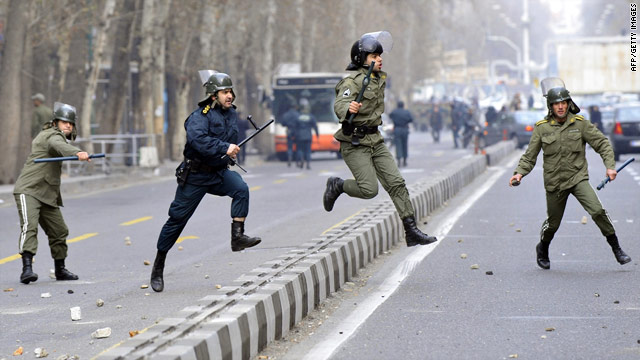Iran sentences 11 demonstrators to death

- Eleven rioters sentenced to death for post-election riots, according to Iranian press
- Two of the sentences have been carried out; the rest are under appeal, ISNA said
- Anti-government demonstrations began after the disputed June 12 presidential vote
- Witnesses said hundreds of protesters were arrested on the Ashura holy day on December 27
Tehran, Iran (CNN) -- Tehran's Revolutionary Court sentenced 11 people to death after convicting them of participating in post-election riots, state media reported Thursday.
Two of the sentences have been carried out; the rest are under appeal, the Iranian Students News Agency said, quoting a court official.
These are the first executions known to be related to the post-election violence that erupted across Iran in June and has continued since, Amnesty International said in a statement condemning the hangings.
But a lawyer for one of the men executed on Thursday disputed a key part of the official report.
"Both of these men were arrested two months before the elections and they were in prison until their sentences were carried out. So how can someone who's in prison take part in protests?" asked Nasrin Sotoudeh, a Tehran-based human rights lawyer who represented Arash Rahmanipour, one of two men hanged Thursday.
Full coverage of the protests in Iran
 Video: Iran hangs two men, but why?
Video: Iran hangs two men, but why?
 Video: Dad learns of son's death on TV
Video: Dad learns of son's death on TV
His father had been scheduled to visit Rahmanipour on the day of the execution, and learned only from a TV report that his son was dead, Sotoudeh said, describing the family as "extremely upset and shocked."
"Arash called his home two nights ago (Tuesday night) -- two nights before the sentence was carried out, and at that point Arash had no idea that his sentence was about to be carried out," she said.
She said the hanging violated Iranian law.
"The entire process, the investigation, the trial, the handing down of the sentence and the carrying out of the sentence, were done illegally and in secret," she told CNN by phone. "Arash's family and I did not have his case file. A sentence must first be announced to the defendant and his lawyer and only then can it be carried out, but this sentence was never announced to Arash or myself."
She said he had been forced to confess.
"He told me his pregnant sister had been arrested, too," she said. "In two sessions where he was interrogated, they placed his sister in front of him and told him if he wanted to see her free he had to admit to things he didn't do."
Rahmanipour's sister was later released from prison but lost the baby due to stress, Sotoudeh said.
Rahmanipour, 20, was charged with being a mohareb, or enemy of God, and being a member of Anjoman-e Padeshahi-e Iran (API), a banned anti-regime monarchist group, his lawyer said.
Amnesty International condemned the execution of Rahmanipour and the other man executed Thursday, Mohammad Reza Ali-Zamani.
"These men were first unfairly convicted and now they have been unjustly killed. It is not even clear they had links to this group, as their 'confessions' appear to have been made under duress," said Hassiba Hadj Sahraoui, Amnesty International's Middle East and North Africa deputy director.
The court said the defendants were convicted of "waging war against God, trying to overthrow the Islamic government" and membership in armed and anti-revolutionary groups.
Anti-government demonstrations began after the disputed June 12 presidential vote, which re-elected hardline President Mahmoud Ahmadinejad over main opposition candidate Mir Hossein Moussavi.
Late December marked the deadliest clashes in Iran since initial protests broke out in the summer.
At least seven people were killed and hundreds were arrested, witnesses said, as they took to the streets on Ashura, which occurred on December 27.
The Iranian government has denied that its security forces killed anyone and has blamed reformists for the violence.
